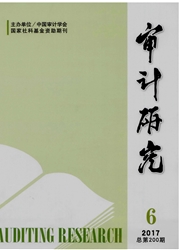

 中文摘要:
中文摘要:
扶贫资金审计是“十三五”时期的重点审计工作之一。我国的扶贫攻坚战已进入最后决胜阶段,扶贫任务十分艰巨。而目前扶贫资金使用效率低下,存在资金闲置、浪费、冒领、挪用、违规使用、贪污腐败等行为,迫切需要加强对扶贫资金使用的监控。本文基于我国扶贫开发面临的援助困境、公共受托经济责任理论和公共管理理论阐述了扶贫开发资金监控对国家审计的内在需求;通过对现状分析,发现我国扶贫资金审计目前在审计目标、审计内容、审计方法、成果利用、审计整改、信息公开、制度建设等方面还存在一些不足。针对这些不足,从关注绩效、扩展审计内容、充分利用大数据、提高审计成果利用率、强化审计整改、加大审计结果公告力度和逐步构建扶贫审计工作长效机制等七个方面提出完善扶贫资金审计的对策建议。
 英文摘要:
英文摘要:
overty alleviation funds audit is one of the most important audit tasks in the 13th five-year plan period of China. China' s poverty alleviation campaign has entered the final decisive stage, the task is extremely difficult. At present, there are still many problems existing in the usage of poverty alleviation funds. So it is very urgent to strengthen the audit on poverty alleviation funds. In order to implement the national policy and safeguard public in- terest, state audit discovers and exposes problems so as to promote the implementation of precise national anti-pov- erty policies. This paper analyzed the dilemma existing in the poverty alleviation funds audit, and put forward some measures for improving the poverty alleviation funds audit, namely, to strengthen the performance audit, to extend audit content, to make full use of Big Data, to improve the utilization ratio of audit achievements, to strengthen au- dit rectification, to push forward audit result announcement and to make efforts to build a long-term mechanism for poverty alleviation funds audit.
 同期刊论文项目
同期刊论文项目
 同项目期刊论文
同项目期刊论文
 期刊信息
期刊信息
